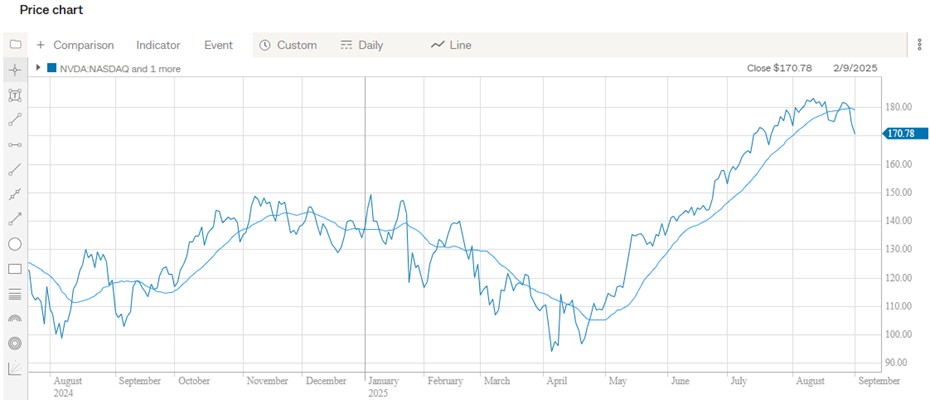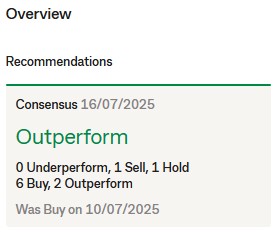Stock in Focus: Nvidia Corp (NASDAQ:NVDA)
 CommSec
CommSec
9 September 2025
How is the world’s largest company responding to geopolitics entering the AI space?
Many people will have heard of, and/or recently used, one of the “Magnificent Seven” – a grouping of the world’s largest and most influential tech companies, including Alphabet (owner of Google), Meta (owner of Facebook), Apple and Microsoft1. But did you know none of these actually top the exalted list?
Founded in 1993 and headquartered in Santa Clara, California, Nvidia is the world’s largest company, with a market cap of US$4.24tn as of September2. The tech giant is a leading developer of graphics processing units (GPUs), which traditionally were used to enhance the experience on computing platforms, most notably in gaming applications on PCs. GPU use cases have since emerged as important semiconductors used in artificial intelligence (AI)3.
Nvidia not only offers AI GPUs, but also a software platform, Cuda, used for AI model development and training. The company is also expanding its data centre networking solutions, helping to tie GPUs together to handle complex workloads4.
Earlier this year, Nvidia captured a dominant 92% of the add-in-board GPU market, extending its lead over rivals Advanced Micro Devices and Intel5.
“Nvidia’s GPUs handle parallel processing workloads, using many cores to efficiently process data at the same time,” says Morningstar6.
“In contrast, central processing units, or CPUs, such as Intel's processors for PCs and servers, or Apple’s processors for its Macs and iPhones, process the data of ‘0's and 1's’ in a serial fashion.
“The wheelhouse of GPUs has been the gaming market, and Nvidia’s GPU graphics cards have long been considered best of breed.”7
Mixed bag on earnings
On 27 August, the company announced revenue of US$46.7bn for the 2026 fiscal second quarter, up 6% from Q1 and 56% from a year ago, as well as net income of US$26.4bn8 – figures described by CommSec Market Analyst Steven Daghlian (among other analysts) as “underwhelming to the market”, though as he also clarified, “it’s tough to delight investors when your share price has close to doubled in five months and you’re now the world’s largest company”9.
Nvidia’s share price has indeed been ascendant since April 2025, hitting a record US$183.16 on 12 August10. “No surprise, but there is still tremendous demand for Nvidia’s artificial intelligence products with no signs of a slowdown,” notes Morningstar11.
Nvidia also caught the market by surprise in August by announcing a record-breaking US$60bn share buyback program12.
The China conundrum
Despite accounting for 13% of Nvidia’s revenue in the past financial year13, China is proving to be somewhat of a headache for the company.
In April, the Trump administration blocked Nvidia from selling its current-generation H20 chip into the Chinese market, citing security concerns14. But in August, the White House announced Trump and Nvidia CEO Jensen Huang had struck a deal in which Nvidia would receive export licenses in exchange for 15% of China sales of the H20 going to the U.S. government15. China has since retaliated by blocking importation of the H20s16.
Meanwhile, Chinese rival to Nvidia, Cambricon, claimed a year-on-year revenue surge of more than 4000%17. Cambricon is just one of several Chinese companies vying to be a local alternative to Nvidia for providing the chips needed to train and run AI applications and models, in an environment where Chinese authorities are allegedly instructing companies to avoid using Nvidia’s H20 chips18.
Nevertheless, Morningstar predicts that “Nvidia will resume selling previously banned H20 AI products [or perhaps newer equivalents] into China19.
“Although we reduce and push out our estimates for China revenue, the increase in US supply leads us to boost our near- and medium-term growth rates.”20
Buy or sell?
Morningstar maintains a fair value stock estimate of US$190 for Nvidia, suggesting the current share price of just over US$174 (as of 2 September) is slightly undervalued21.
“Nvidia has a wide economic moat, thanks to its market leadership in GPUs, hardware, software, and networking tools needed to enable the exponentially growing market around AI,” says Morningstar22.
“In the long run, we expect tech titans to strive to find second-sources or in-house solutions to diversify away from Nvidia in AI, but these efforts will, at best, only chip away at, but not supplant, Nvidia’s AI dominance.”23
On the bearish side, however, Morningstar also notes that “AI infrastructure spending has been impressive but revenue and use cases are less certain, perhaps providing doubts that there is a good return on investment on AI that might lead to a spending downturn at some point in the future”24.
As of 29 August 2025, there is an “outperform” consensus for Nvidia stock, suggesting it will likely produce higher returns than the major market indexes for at least the foreseeable future25.




